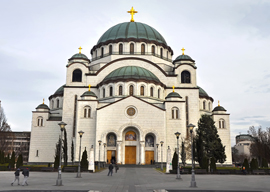
December 04, 2017

Church of Saint Sava, Belgrade
Source: Bigstock
After hitting the skids a few years ago, I moved to Serbia. Hell, it was fun. Belgrade had been bombed in ’99. The laser-guided ordnance was so accurate it could follow streets. The Serbs set up rooftop barbecues and watched. Some wag produced T-shirts emblazoned with crosshairs, which became best-sellers. When the government closed the university and imposed a curfew, the nightclubs opened during the day. By some reckoning it was the fortieth assault in the city’s history on the religious fault line of Europe. So when the bombs started to fall again, they figured: Don’t sweat the big stuff.
Fifteen years later, the gray hulks remained; each one with an impact crater like the hollowed-out yolk of a boiled egg. My bathroom window looked onto one. As the seasons changed, the concrete shell went from a hundred degrees to being choked with snow. The government had left them as a double reminder: to the outside world, of what it had done; and to the Serbs, that the West is not your friend.
In the mountains close to the Bosnian border, the hideouts of recently convicted Ratko Mladić have become local landmarks. “Mladić lived there,” they say with tired ambivalence as you pass a falling-down cabin. It may not be the best claim to fame, but it’s better than nothing. The wars are both present and absent. An industry of NGOs and “transitional justice” organizations are dedicated to keeping their memory alive. None are more keen than regional politicians, who blow with failing lungs on the dog whistles of history. The multinationals too, in their own way. They segregate their staff by nationality, just in case. Like the Clintons, they’ve been indoctrinated in the “ancient hatreds” of the Balkans by a phalanx of foreign writers.
One souvenir of the last war is an epidemic of cancer blamed on depleted-uranium ordnance, which was used not by local combatants but by NATO. Those who assimilated radioactive material during their teenage growth spurt are now in their early 30s. From first diagnosis to the final goodbye often takes half a year. Everyone knows someone. We passed a girl on the street and asked about her boyfriend. “Oh,” she said. “He’s gone.” She was on her way to clean the accommodation they had moved into six weeks before. We offered to help. “No need,” she said, self-sufficient to the end.
True, get a Serb drunk and they’ll start talking about Kosovo. But this is just their brand of knee-jerk pride (they even have a word for it: inat). They don’t really want it back, any more than they want any involvement with Bosnia. The Bosnian Serbs are an embarrassment to modern Serbia. They are the drunken nephew at the South Slav family picnic, with Russia as the interfering aunt. Moscow intervenes whenever a sleight is leveled at Serbia, most recently when the U.N. attempted to recognize Srebrenica as a genocide. Discussion of Srebrenica usually descends into a macabre numbers game: downward pressure on the figure places you on one side of the conflict, upward pressure on the other. This perverse dance ignores the fact that genocide is a qualitative, not quantitative, business; and that even one civilian murder was too many. Russia vetoed the genocide resolution, of course, quickly shoring up her support among Serb nationalists. The West setting the stage for such Russian grandstanding does little to help Serbia’s government, which is trying to move the population closer to the E.U. Yet when the Russian bear offers something material—like this year’s gift of six MiG-29 fighters—her impoverished cub can ill afford to say no.
The younger generation wants to forget the past. They look across the border to huge shopping centers strategically built just inside the pale of the E.U., and stream Western shows to polish their excellent English. “The Hungarians?” said a taxi driver in a pink polo shirt and mirrored aviators. “Their English is terrible…and they dress like idiots!” Those who go on secondment into the E.U. are shocked at how little work people do—at least in Italy. They want a better chance to prove themselves. When Britain revoked visa-free travel—a move that Serbia’s nascent tourism sector could ill afford to reciprocate—it stung deeply.
Even so, Belgrade is going through a weird rebirth. The bombed ministries are finally being covered and redeveloped. A huge sprawl of railway sidings along the Sava River is being turned into a sparkly new CBD. The redevelopment money has come from Abu Dhabi in a deal brokered by Tony Blair, who codirected the most recent bombing (such irony is not lost on Balkan conspiracy theorists). What will now happen to the gypsy encampments that used to line the river is anyone’s guess; not least given how much strong-arming has already surrounded the project. With tremendous élan, the city government stopped a rush-hour tram to hide protests against its signing ceremony. Neither does anyone know who will actually occupy this Ozymandian edifice: The average monthly salary in Serbia is €400 and not going north anytime soon.